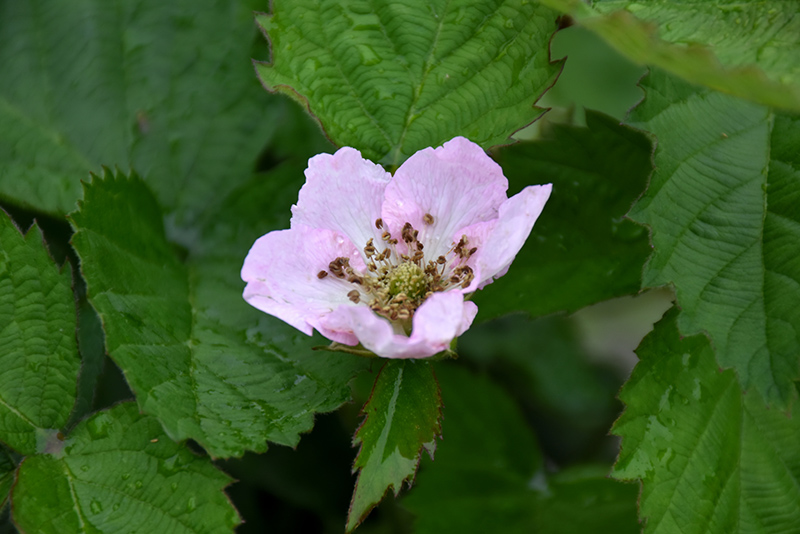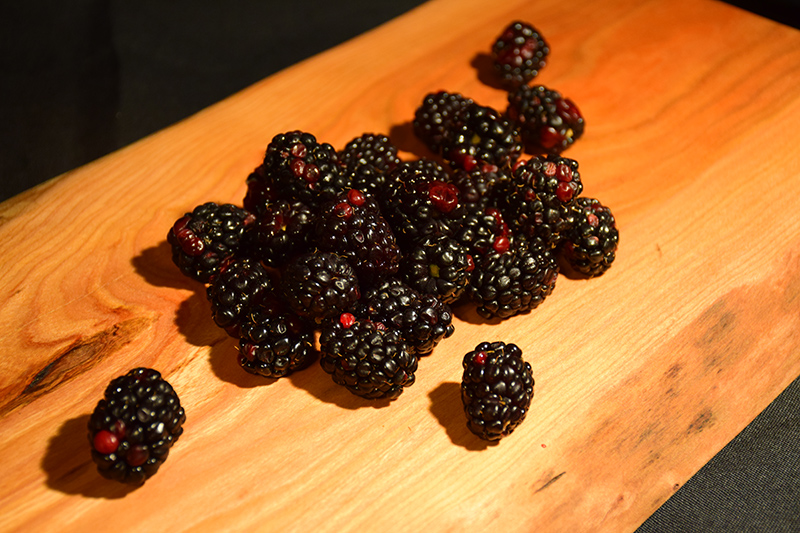Plant Finder
Height: 6 feet
Spread: 10 feet
Sunlight:
![]()
Hardiness Zone: 5
Other Names: Thornless Blackberry
Group/Class: Floricane - Summer Bearing
Description:
A self-fertile, fast growing thornless variety with large, sweet, high quality berries with good flavor; blackberries are quite shrubby looking and require careful placement in the landscape, a specific pruning regimen and protection from birds
Edible Qualities
Arapaho Blackberry is a medium-sized shrub that is typically grown for its edible qualities. It produces clusters of black heart-shaped berries which are usually ready for picking in mid summer. The berries have a sweet taste and a juicy texture.
The berries are most often used in the following ways:
- Fresh Eating
- Cooking
- Baking
- Preserves
- Canning
- Freezing
Features & Attributes
Arapaho Blackberry features dainty white cup-shaped flowers with shell pink overtones and tan anthers at the ends of the branches in mid spring. It has green deciduous foliage. The fuzzy oval compound leaves do not develop any appreciable fall color. It features an abundance of magnificent black berries in mid summer.
This is an open multi-stemmed deciduous shrub with an upright spreading habit of growth. Its relatively coarse texture can be used to stand it apart from other landscape plants with finer foliage. This is a high maintenance plant that will require regular care and upkeep. Each spring, cut back all dead and two-year old canes to the ground, leaving only last year's growth standing. It is a good choice for attracting birds to your yard. Gardeners should be aware of the following characteristic(s) that may warrant special consideration;
- Suckering
- Disease
Aside from its primary use as an edible, Arapaho Blackberry is sutiable for the following landscape applications;
- Mass Planting
- Naturalizing And Woodland Gardens
- Orchard/Edible Landscaping
- Container Planting
Planting & Growing
Arapaho Blackberry will grow to be about 6 feet tall at maturity, with a spread of 10 feet. It tends to be a little leggy, with a typical clearance of 2 feet from the ground, and is suitable for planting under power lines. It grows at a fast rate, and under ideal conditions can be expected to live for approximately 10 years. This is a self-pollinating variety, so it doesn't require a second plant nearby to set fruit.
This shrub may not always play well with others; as such, it is best grown in its own designated garden space or isolated area of an edibles garden. It should only be grown in full sunlight. It prefers to grow in average to moist conditions, and shouldn't be allowed to dry out. It is not particular as to soil type or pH. It is somewhat tolerant of urban pollution. This particular variety is an interspecific hybrid. It can be propagated by division; however, as a cultivated variety, be aware that it may be subject to certain restrictions or prohibitions on propagation.
Arapaho Blackberry is a good choice for the edible garden, but it is also well-suited for use in outdoor pots and containers. With its upright habit of growth, it is best suited for use as a 'thriller' in the 'spiller-thriller-filler' container combination; plant it near the center of the pot, surrounded by smaller plants and those that spill over the edges. It is even sizeable enough that it can be grown alone in a suitable container. Note that when grown in a container, it may not perform exactly as indicated on the tag - this is to be expected. Also note that when growing plants in outdoor containers and baskets, they may require more frequent waterings than they would in the yard or garden.








